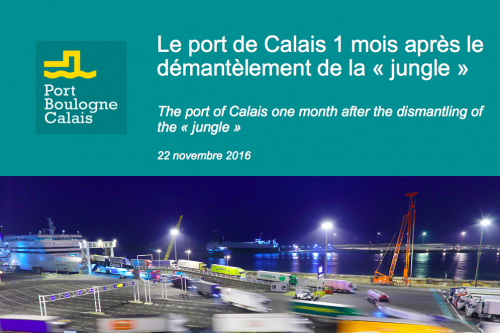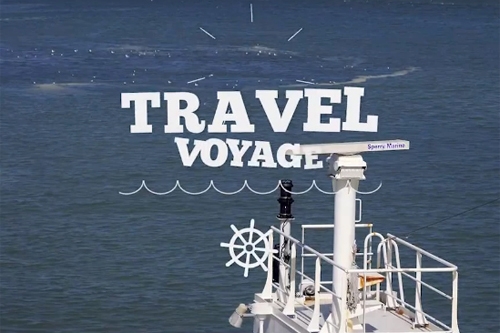Security fully recovered at the port of Calais 1 month after the dismantling of the “Jungle”
Published on 22.11.2016
Calais, 22 November 2016 – The Port Boulogne Calais together with the Port of Dover, P&O Ferries and DFDS presented today the impact of the dismantling of the “Jungle” one month ago. With an 87% decrease in migrant detection as well as lorries infiltrated, customer confidence is back on the rise.
The dismantling of the so-called “Jungle”, one month ago, was a long awaited measure to ensure the smooth operation of the port of Calais and the safe arrival of professionals and passengers on their way to the UK. The presence of one the EU’s largest migrant camps so close to the port could no longer be sustained.
Migrants detected down by 87%
The dismantling has had a direct positive impact on the operation of the port of Calais. Over the past month the number of migrants detected aboard vehicles by the port’s services has decreased by 87%. The number of lorries in which migrants were found also decreased by 87,5%. Simply put, whereas before 12 vehicles per day were found with migrants aboard it is now down to only 12 vehicles a week.
Assaults on the port’s access road eliminated since 28 October
The French authorities have indicated that no assault on the port’s access road occurred since the completion of the dismantling of the “jungle’s” on 28 October. Intrusion attempts onto the port’s premises also greatly decreased with only 3 reported cases since 28 October.
Taken together with the port’s security services figures, these official numbers demonstrate the very positive impact the dismantling of the “Jungle’s” has had on ensuring the safety of people and goods travelling to the UK from Calais. It also shows that migrants’ attempts to board lorries have been almost entirely eliminated in Calais.
Traffic back on the rise
The impact of the dismantling on the activity of the port of Calais can already be noticed. Compared to a similar period in 2015, freight traffic on the port of Calais increased by 2,17% and if we compare November 2016 with November 2016 this increase is of 8,89%.
Most of the attacks on the access road occurred at night which encouraged professionals and passengers to only travel by day despite the fact that ferries operate 24hrs a day between Calais and Dover. Since the dismantling, we have noticed an 26% increase in night traffic which demonstrates the renewed confidence in the accessibility of the port at night.
According to Jean-Marc Puissesseau, Chief Executive Officer of the Port Boulogne Calais: « the port could no longer function with a migrant camp this large and this close and we are therefore relieved by its dismantling. We have always worked to improve the port’s security but there is only so much that could be
done at the port level. We are now thankfully back to a normal operation with safety fully back. I now hope that customer confidence will also return shortly. »
Tim Waggott, Chief Executive, Port of Dover, said: "The Dover-Calais route is a vital international trade and transport corridor. Dover handles £119 billions of trade in goods with 75% going via Calais. This will always be the shortest crossing between the UK and mainland Europe. It is therefore essential that it is also a safe and secure gateway for the efficient movement of people and goods as we work to keep our economies moving."
Pascal Devaux, P&O Ferries Calais Port Manager, has declared: "We welcome the prompt closure by the French government of the migrant camp in Calais known as ‘the jungle’. Everyone who travels through the Port of Calais has a right to a fluid, safe and secure journey, ensuring people and goods keep moving. We continue to work closely with the French government to ensure that the Channel ports remain open for business”.
Kasper Moos, managing director of DFDS in the UK, declared: “The improved security situation in Calais following the closure of the migrant camp there last month is good news for our freight customers and passengers. It is vital that our customers can go about their business uninterrupted, bringing economic benefits not just to the Kent and Nord Pas de Calais regions, but to the national economies of the UK and France. We’ll continue our work with the French authorities to improve the situation further and to continue to grow business on our routes to France.”
Download the illustrated presentation








